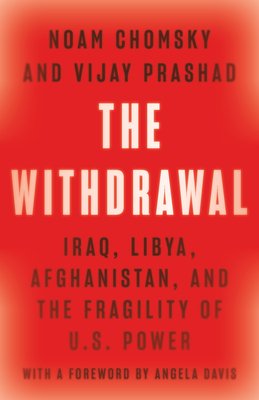
Book Review of The Withdrawal: Iraq, Libya, Afghanistan, and the Fragi…
Book Review: The Withdrawal: Iraq, Libya, Afghanistan, and the Fragi… by Noam Chomsky
From the very first page of Noam Chomsky’s The Withdrawal, I was struck by the gravity of the subject matter. As someone who has long been fascinated by the intricate dance of global power dynamics, Chomsky’s examination of U.S. military interventions in Iraq, Libya, and Afghanistan felt particularly timely and crucial. The title alone captures an unsettling truth: it’s not simply about withdrawal; it’s about the lingering impact and devastation left in its wake.
Chomsky adeptly navigates through the annals of recent history, weaving a narrative that connects military actions with profound humanitarian consequences. One theme that resonated deeply with me was the critique of the so-called "Rules Based Order.” Chomsky highlights how this phrase often serves as a euphemism for the U.S. expectation for other countries to submit to its will. The analysis prompts readers to question who truly benefits from these military actions—is it the citizens of the intervened nations, or is it merely the arms manufacturers and private contractors who thrive amidst chaos?
Chomsky’s writing style is both incisive and accessible. He combines a historian’s rigor with a storyteller’s flair, crafting a dense tapestry of facts and narratives that kept me engaged throughout. I found his pacing to be deliberate, allowing the weight of each revelation to sink in. There are moments where his voice seems almost prophetic, as he warns of a world where the U.S. operates with little accountability. His assertion that the U.S. has become the “rogue superpower” struck me as a bold but necessary observation, one that underpins the disillusionment that many readers may feel regarding contemporary foreign policy.
Among the many powerful quotes in this book, one stood out for its haunting clarity: “You can’t permit a country you’re trying to destroy to have a deterrent capacity.” This encapsulates the relentless drive for dominance that has characterized U.S. interventions. It left me pondering not only the ethical implications of such policies but also the broader question of what kind of world we want to live in.
The Withdrawal is not merely an academic critique; it’s a call to consciousness for anyone who cares about the world’s future. Chomsky’s thoughtful dissection of the past holds significant lessons for today’s geopolitical landscape, encouraging readers to approach current events with a critical eye.
I believe that this book will resonate with anyone interested in foreign policy, sociology, or human rights. Its impact is magnified by the urgency of our times, making it a significant read for activists, scholars, and everyday citizens alike. Personally, it has deepened my understanding of the complexities involved in military actions and their far-reaching consequences.
In a world where disengagement can often feel like the easiest path, Chomsky’s The Withdrawal challenges us to remain engaged, empathetic, and informed. It isn’t just a book to read; it’s a manifesto that demands reflection, conversation, and action. If you’ve ever found yourself questioning the narratives surrounding U.S. foreign policy, this book is not to be missed.
Discover more about The Withdrawal: Iraq, Libya, Afghanistan, and the Fragi… on GoodReads >>






